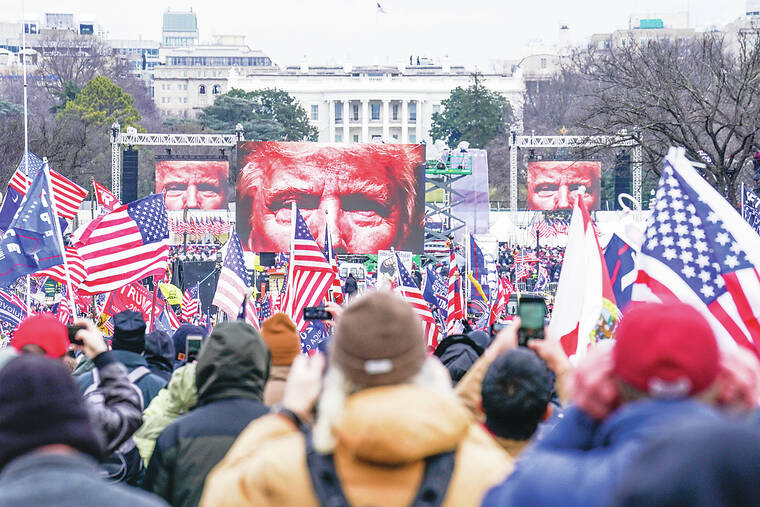How two sentences in the Constitution rose from obscurity to ensnare Donald Trump
In the summer of 2020, Gerard Magliocca, like many during the coronavirus pandemic, found himself stuck inside with time on his hands.
A law professor at Indiana University, Magliocca figured he would research the history of two long-neglected sentences in the Constitution’s 14th Amendment. Dating to the period just after the Civil War, they prohibit those who “engaged in insurrection or rebellion” from holding office.
ADVERTISING
On Jan. 6, 2021, after then-President Donald Trump’s supporters stormed the U.S. Capitol to try to block certification of his loss to Joe Biden, Magliocca watched as Republicans such as Sens. Mitch McConnell and Mitt Romney described the attack as an “insurrection.”
That night, Magliocca composed a quick post on a legal blog: “Section Three of the Fourteenth Amendment,” he wrote, “might apply to President Trump.”
Just over four years later, the U.S. Supreme Court will have to determine whether it does. On Thursday, the nation’s highest court is scheduled to hear arguments over whether Trump can remain on the ballot in Colorado, where the state’s Supreme Court ruled that he violated Section 3.
It’s the first time the Supreme Court has heard a case on Section 3, which was used to keep former Confederates from holding government offices after the amendment’s 1868 adoption. It fell into disuse after Congress granted an amnesty to most ex-rebels in 1872.
Before the attack on the Capitol, even many constitutional lawyers rarely thought about Section 3. It hadn’t been used in court for more than 100 years. Its revival is due to an unlikely combination of Democrats and Republicans, rediscovering 111 words in the nation’s foundational legal document that have now become a threat to the former president’s attempt to return to office.
In the days after Jan. 6, thanks to scholars such as Magliocca, Section 3 started its slow emergence from obscurity.
Free Speech For People, a Massachusetts-based liberal nonprofit, sent letters to top election officials in all 50 states in June 2021, warning them not to place Trump on the ballot should he run again in 2024.
The group didn’t hear back from any of them.
“People were just treating it as something that was not serious,” recalled John Bonifaz, the group’s co-founder.
In January 2022, Free Speech For People filed a complaint in North Carolina to disqualify Republican Rep. Madison Cawthorn under Section 3. Cawthorn lost his primary, mooting the case.
That same month, the group Citizens for Responsibility and Ethics, also known as CREW, decided to test Section 3 in court.
In 2022, both Free Speech For People and CREW began scouring state ballot laws, looking for places that allowed the rapid contesting of a candidacy. CREW settled on Colorado.
Sherman and another CREW attorney, Nikhel Sus, contacted Martha Tierney, a veteran election lawyer who also served as general counsel of the state Democratic Party.
Tierney wasn’t acting as the Democratic Party’s lawyer, but CREW wanted to balance its team. Sherman contacted Mario Nicolais, a former Republican election lawyer who had left the party over Trump.
Nicolais’ first interaction with Sherman was a direct message about the case on X, the social media platform previously known as Twitter. Nicolais thought it could be from a crank.
“Is this for real or is this from somebody just angry at the president?” Nicolais recalled wondering.
On Sept. 6, 2023 — one year from the disqualification of Griffin — their 105-page complaint was filed in district court in Denver.
Wallace issued her decision on Nov. 17. She found that Trump had “engaged in insurrection” but ruled that it wasn’t certain that the authors of the 14th Amendment meant it to apply to the president. Section 3 refers to “elector of President and Vice President,” but not the office itself.
CREW was just a legal sliver away from victory. It just needed the Colorado Supreme Court to uphold all of Wallace’s ruling besides the technicality of whether the president was covered.
On Dec. 19, the court announced it would issue its decision that afternoon — ruling 4-3 that Trump was disqualified. The decision was put on hold, pending the outcome of the case that will be argued Thursday.


